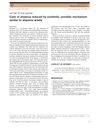 19 citations,
June 2002 in “American Journal of Dermatopathology”
19 citations,
June 2002 in “American Journal of Dermatopathology” Apoptosis contributes to hair loss in androgenetic alopecia.
 6 citations,
October 2016 in “Journal of Chemotherapy”
6 citations,
October 2016 in “Journal of Chemotherapy” A man lost all his hair as a rare side effect after hepatitis C treatment.
 4 citations,
December 2020 in “Journal of Dermatology”
4 citations,
December 2020 in “Journal of Dermatology” Impaired autophagy may cause hair loss by triggering early catagen.
 2 citations,
July 2018 in “Journal of Cosmetic Dermatology”
2 citations,
July 2018 in “Journal of Cosmetic Dermatology” Common latent viruses might contribute to male-pattern baldness by disrupting cell processes that normally suppress hair loss-related proteins.
 43 citations,
March 2006 in “Seminars in Cutaneous Medicine and Surgery”
43 citations,
March 2006 in “Seminars in Cutaneous Medicine and Surgery” Different types of hair loss have unique features under a microscope, but a doctor's exam is important for accurate diagnosis.
 33 citations,
September 2012 in “Australasian Journal of Dermatology”
33 citations,
September 2012 in “Australasian Journal of Dermatology” Chemotherapy can cause hair changes similar to alopecia areata, which might lead to misdiagnosis.
 148 citations,
December 2018 in “Journal of autoimmunity”
148 citations,
December 2018 in “Journal of autoimmunity” Alopecia areata is an autoimmune disease causing patchy hair loss, often with other autoimmune disorders, but its exact causes are unknown.
 54 citations,
January 1983 in “Archives of Dermatology”
54 citations,
January 1983 in “Archives of Dermatology” KFSD is a rare condition causing scarring hair loss, with no effective treatment known at the time of the report.
 50 citations,
March 2001 in “Clinics in Dermatology”
50 citations,
March 2001 in “Clinics in Dermatology” Genes and hormones cause hair loss, with four genes contributing equally.
 46 citations,
May 2012 in “Molecular and Cellular Endocrinology”
46 citations,
May 2012 in “Molecular and Cellular Endocrinology” Human skin produces sex hormones like estrogen and testosterone, influenced by ARO and StAR, which may affect skin elasticity and hair growth.
 4 citations,
November 2017 in “The Journal of Dermatology”
4 citations,
November 2017 in “The Journal of Dermatology” Sorafenib may cause hair loss in a way similar to alopecia areata.
 August 2024 in “Dermatology and Therapy”
August 2024 in “Dermatology and Therapy” Vorasidenib can cause unusual hair growth.
 March 2020 in “Clinical research in dermatology”
March 2020 in “Clinical research in dermatology” Two unusual cases showed that Lichen Planopilaris can look like other skin conditions and need early treatment to protect hair.
 August 2023 in “International journal of research and review”
August 2023 in “International journal of research and review” Homeopathy can effectively treat pattern hair loss by using remedies like Lycopodium Clavatum and Natrum Muriaticum, tailored to the patient's overall condition.
 80 citations,
January 1995 in “The American Journal of Medicine”
80 citations,
January 1995 in “The American Journal of Medicine” Hair loss in androgenetic alopecia is caused by genetic factors and androgen excess, and can be treated with combined therapies.
66 citations,
February 2007 in “The journal of investigative dermatology/Journal of investigative dermatology” Adenosine may promote hair growth by increasing FGF-7 levels in dermal papilla cells.
 58 citations,
January 2006 in “Skin Pharmacology and Physiology”
58 citations,
January 2006 in “Skin Pharmacology and Physiology” High levels of testosterone and 5α-DHT can lead to cell death in cells important for hair growth.
36 citations,
January 2010 in “International Journal of Trichology” Intralesional steroids can help regrow hair in some alopecia areata patients but have side effects.
 12 citations,
June 2017 in “Cell Cycle”
12 citations,
June 2017 in “Cell Cycle” Minoxidil foam helps hair growth by increasing good proteins and decreasing bad pathways in men with hair loss.
 9 citations,
October 1988 in “Clinics in Dermatology”
9 citations,
October 1988 in “Clinics in Dermatology” Hair loss is caused by genetics and hormones, diagnosed through examination and biopsy, and treated with medications or surgery.
 3 citations,
April 2019 in “The journal of investigative dermatology/Journal of investigative dermatology”
3 citations,
April 2019 in “The journal of investigative dermatology/Journal of investigative dermatology” ILC1 cells contribute to hair loss in alopecia areata.

γδTregs may help treat autoimmune diseases like alopecia areata by promoting hair regrowth and reducing immune attacks.
November 2022 in “Journal of Investigative Dermatology” Cell-based therapy using specific immune cells may help treat alopecia areata by promoting hair regrowth.
 April 2024 in “Liječnički vjesnik”
April 2024 in “Liječnički vjesnik” Modern treatments can effectively regrow hair and improve life for people with alopecia areata.
 July 2015 in “Journal of the Dermatology Nurses’ Association”
July 2015 in “Journal of the Dermatology Nurses’ Association” A 66-year-old woman experienced hair loss due to Frontal Fibrosing Alopecia, a condition with no consistently effective treatment, but it usually stabilizes over time. More research is needed for better understanding and treatment options.
 152 citations,
April 2012 in “Recent Patents on Inflammation & Allergy Drug Discovery”
152 citations,
April 2012 in “Recent Patents on Inflammation & Allergy Drug Discovery” Minoxidil treats hair loss, promotes growth, has side effects, and has recent patents.
 55 citations,
November 2018 in “American journal of human genetics”
55 citations,
November 2018 in “American journal of human genetics” Mutations in the LSS gene cause a rare type of hereditary hair loss.
 17 citations,
December 2004 in “The Journal of Men's Health & Gender”
17 citations,
December 2004 in “The Journal of Men's Health & Gender” Male pattern baldness involves hormone-related hair thinning, shorter hair, and inflammation.
 13 citations,
May 1993 in “International Journal of Dermatology”
13 citations,
May 1993 in “International Journal of Dermatology” The paper suggests that telogen effluvium, a type of hair loss, may be a long-lasting condition triggered by stress or illness in people whose hair growth is unusually synchronized.
 2 citations,
October 2017 in “Revista Da Associacao Medica Brasileira”
2 citations,
October 2017 in “Revista Da Associacao Medica Brasileira” Removing p16INK4a from skin cells can lead to faster and more clumped growth, which might help with hair growth.



























